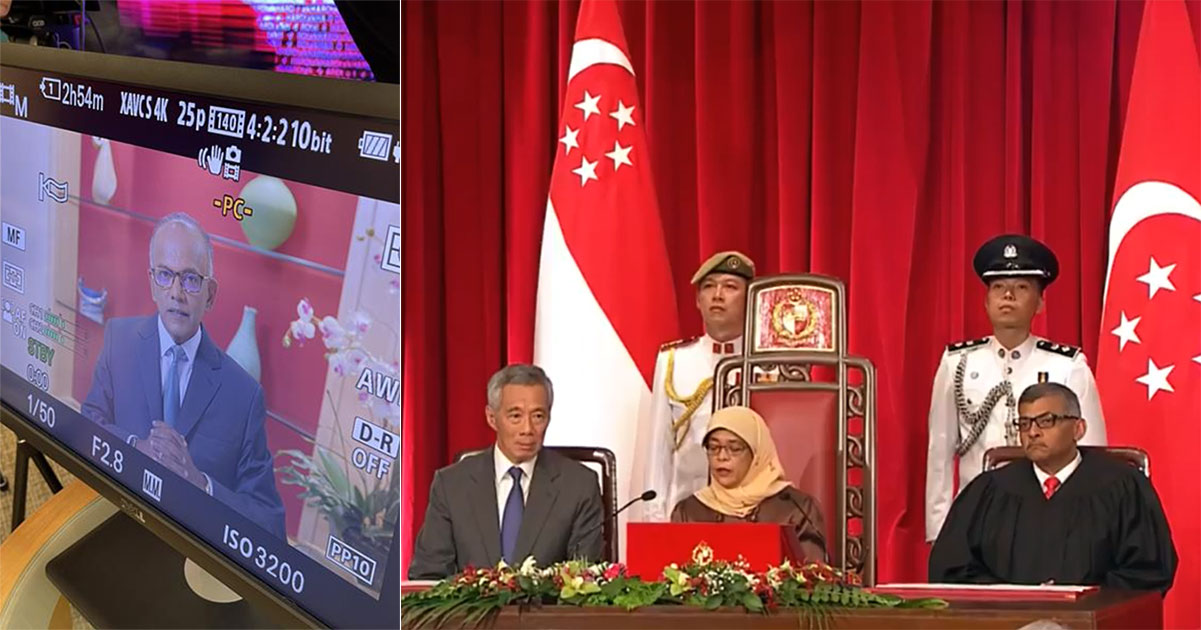Follow us on Telegram for the latest updates: https://t.me/mothershipsg
Racism does exist in Singapore, just like in most other multi-racial societies, Minister for Law and Home Affairs K Shanmugam said during a 24-minute BBC podcast interview in response to questions by British journalist and presenter Stephen Sackur.
He was asked on the BBC current affairs show Hardtalk, which was aired on June 29, if there was "routine, systemic discrimination" that targets the Malays and Indians in Singapore.
HardTalk has been touted as an interview format that pulls little punches, and its previous guests have included Prime Minister Lee Hsien Loong, as well as the late Lee Kuan Yew, Singapore's first prime minister.
PM Lee last sat down with Sackur in a Hardtalk interview in 2017, when he spoke about how Singapore is navigating a wide range of international and domestic issues in uncertain times.
How realistic for a minority to be Singapore PM?
In response to a question regarding how realistic it is for a minority to be prime minister of Singapore, Shanmugam shot back: "Leaving me aside, I don't think it is accurate to say an Indian cannot be a prime minister, or a Malay cannot be a prime minister."
"How many non-white prime ministers have there been in the United Kingdom? So, let's get real. Race does matter in politics."
There is no non-white prime ministers among the 55 prime ministers in the history of the UK.
Shanmugam on race matters
Here's a transcript of Shanmugam's response to questions on race in Singapore.
Stephen Sackur: I see in The Economist magazine, which has some influence, it referred to a rising tide of ugliness with regard to racial discrimination in Singapore, which it said is provoking a reckoning over race. Now, as Home Affairs Minister, are you worried about the evidence presented – of routine systemic, discrimination particularly against Malay people in Singapore, and to a certain extent, Indian people as well?
Minister: Again, you know, there are various assumptions, that there is routine discrimination, and that this is systematic. You're not producing any evidence to this effect. I would say –
Stephen Sackur: Well, as I said, The Economist magazine and others have produced evidence which gets to the very heart of the problem.
Minister: What is the evidence?
Stephen Sackur: It shows that when people look for housing, to rent housing, it is quite plain. And many people have done this – quite plain – that in many places, ethnic Chinese people are favoured, and it's impossible for Indian or Malay people to rent in certain neighbourhoods. When it comes to the workplace, often jobs are advertised which say “Mandarin essential”, when it is quite plain that Mandarin actually isn't essential, but it's a way of ensuring that ethnic Chinese people get the job. That happens. You live in Singapore; you know it happens!
Minister: Let me explain to you, let me tell you. First of all, no one will deny that racism exists in Singapore, just like it exists in most other societies which are multi-racial. The question is, how systemic it is, and how much does it happen? And if you want an extended discussion on that, I'm happy to do it. But my own experience as a minority in Singapore, and the experience of many others is: on the whole, compared with many other societies, it’s much less in Singapore. And this thing about housing is interesting. 93 per cent of Singaporeans live in their own housing. So, what you're talking about are foreigners who are seeking housing in Singapore. So, you know, people get their facts confused and mixed up.
Stephen Sackur: I suppose the biggest test of all of this – if I may say so – the biggest test of all of this will be what happens at the very top. Now, the current prime minister has just made it plain who his successor is going to be. It's going to be Lawrence Wong, the current Finance Minister. That will mean that the four leaders of independent Singapore in the modern era have all been ethnic Chinese. You're a very senior minister yourself. You've been in ministerial jobs for much more than a decade, you perhaps could have aspired to the top job. Isn't it the reality that you, with your Indian heritage, are never going to be able to be prime minister of Singapore, and that is a great shame, is it not?
Minister: Leaving me aside, I don't think it is accurate to say an Indian cannot be a prime minister, or a Malay cannot be a prime minister. How many non-white prime minister have there been in the United Kingdom? So, let's get real. Race does matter in politics. Survey after survey shows that each race – whether it's the Chinese, or the Malays, or the Indians – there is a substantial preference for a person of their own race to be the prime minister. So, if a Malay or an Indian, starts with, if I remember my numbers right, about a 20 per cent gap. But it's not unbridgeable. A good candidate, in my view, a Malay or Indian candidate, can bridge it as long as the MPs have the confidence that he can lead them into the General Elections and win the elections. I think it's entirely possible, so I would not rule it out. And I don't refer to myself.
You can read Shanmugam's full interview with no omissions by the BBC here in a transcript provided by MHA.
Top photo via Ministry of Home Affairs & Halimah Yacob Facebook
If you like what you read, follow us on Facebook, Instagram, Twitter and Telegram to get the latest updates.
